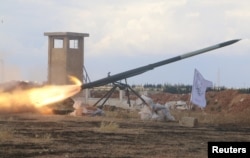The petition by American diplomats who disagree with the Obama administration's Syria policy was distributed on the State Department's "Dissent Channel," intended to give U.S. foreign service professionals an opportunity to express their candid views, even if they conflict with established government policy, without fear of retribution or reprisals.
The Dissent Channel was established decades ago to allow American diplomats to speak freely about foreign policy matters.
It began during the Vietnam War, a time when the nation was in turmoil over widespread dissent to the administration's policy. Junior diplomats felt that pressure from senior officials stifled their ability to present alternative policy views.
"There needed to be a way for people to professionally disagree inside the organization, without going outside" the State Department, former U.S. Ambassador to Afghanistan Ronald Neumann told VOA on Friday.
Neumann, now president of the American Academy of Diplomacy, said the internal petition for a change in U.S. policy on Syria will be read at the highest level of the administration, but that does not mean that current policy will be altered or reviewed.
Biggest petition of dissent
Another veteran U.S. diplomat, former Ambassador to Syria Robert Ford, told VOA the most notable aspect of the petition that made headlines this week was the size of the bloc of dissenters: 51 State Department members who said the United States should be directly targeting the Assad government in Syria with airstrikes.
In his 30-year diplomatic career, Ford said, he had never heard of a Dissent Channel message that had even 10 signatures.
Adam Ereli, a former principal deputy assistant secretary of state — a senior position in the U.S. diplomatic corps — agreed with Neumann that it is unlikely the petition will result in any internal policy review.
The State Department is not releasing to the public the names of those who signed the petition on Syria, and spokespeople stressed that anyone who posts an opinion contrary to official policy on the Dissent Channel need not fear any adverse action as a result.
No reprisals, but ...
A former senior official at the State Department told VOA on Friday that he was unaware of any punitive action against a foreign service officer who used the Dissent Channel to express alternative views. However, the official conceded that dissenters were "taking a risk" that could affect their future careers: If they are seen as not supporting current policies, high-ranking officers "might not give them preference for other jobs or responsibilities in the future."
State Department spokesman John Kirby confirmed Friday that he would not "violate" the confidentiality of the Dissent Channel, even though the message "found its way into the public domain" in published news reports this week.
The State Department has explicit, detailed rules governing use of the Dissent Channel. The forum was created, the regulations say, "to allow its users the opportunity to bring dissenting or alternative views on substantive foreign policy issues, when such views cannot be communicated in a full and timely manner through regular operating channels or procedures, to the attention of the secretary of state and other senior State Department officials in a manner which protects the author from any penalty, reprisal or recrimination."
Non-policy issues, such as personnel matters, do not qualify for inclusion in the Dissent Channel, and only current employees of the Department of State may post notices there.
Former Assistant Secretary of State Chris Hill told VOA the secretary of state's policy planning staff is responsible for management of the Dissent Channel.
When employees feel their voices are not heard by supervisors and they use the Dissent Channel, Hill said, "policy planning staff is supposed to review it, circulate it to authorized people and get an answer back to the drafters."
"That's the rule, and that's been in existence for about 40 years," said Hill, who was U.S. ambassador to Iraq in 2009-2010.





